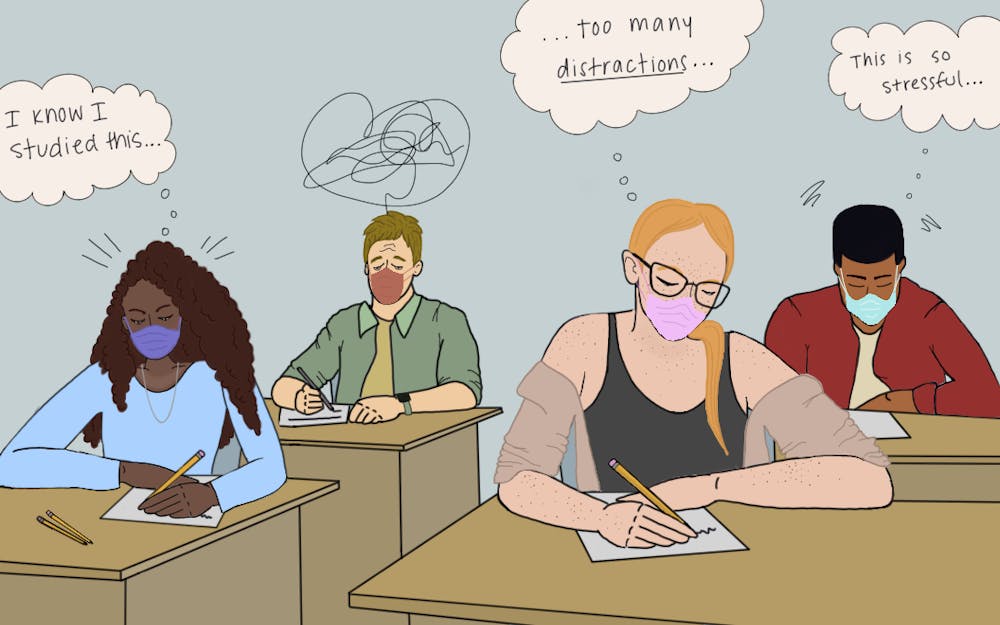I glanced at my syllabus freshman year and saw that 85% of my grade would rely on two cumulative, multiple choice exams. I immediately felt the pressure of the impending semester.
Students like me often spend months combing through pages of readings, lecture notes and online study guides in an attempt to fully absorb a semester's worth of material for a final exam and then, most of the time, forget all about it.
This model of teaching does not effectively equip us with the knowledge and skills instructors so frequently tell us we’ll need to bring into the workplace. How could two exams ensure I’ve gained proper knowledge from a course?
Long, cumulative midterm and final exams have popped up at least once a semester throughout my two and a half years at IU. But these types of exams focus more on in-the-moment evaluation and don’t contribute positively to the real focus of learning: students’ long-term comprehension and retention of important class concepts.
The cumulative multiple choice exam structure is an easy way for instructors to evaluate students with little time taken outside of class. These exams are usually situated at the halfway mark with another at the end of the course and can be easily administered in a single class period and entered into the gradebook by the end of the day. The infrequency of testing, and therefore infrequency of grading, makes this an attractive option for instructors.
But convenience comes at the cost of learning. These types of exams rely almost exclusively on a process called retrieval practice, which the UC San Diego Department of Psychology defines as “recalling to-be-remembered information from memory.” Essentially, if you can recall a piece of information on an exam, it’s safe to say you’ll be able to recall it when you need to apply it in future scenarios.
Retrieval practice is one of the most effective ways of learning new information, according to the UC San Diego Department of Psychology. Everything from grade school spelling tests to college finals rely on retrieval practice as an attempt to measure a student’s level of comprehension.
However, the practice is blatantly misused when applied to solely the cumulative midterm and final exam model and not repeated throughout the semester during class time.
A collection of research on teaching strategies led by Dr. Pooja K. Agarwal, retrievalpractice.org, frames retrieval practice as a strategy of pulling knowledge out of a student’s brain rather than cramming it in.
Its resource page describes criteria and recommendations for effectively using the technique as a learning tool in classrooms from kindergarten up to undergraduate study. These include frequent, spaced out exercises that test students’ day-to-day retention of course knowledge. These can range from bellringer questions to short quizzes or even brief, student-led recaps of the main concepts covered in class.
The most important aspect of these exercises is to encourage every student to engage in retrieval practice on a regular basis rather than cramming and practicing it once or twice on two infrequent examinations. Retrieval practice is equally beneficial when applied to everything from multiple choice to short answer questions, allowing flexibility in the structure of practice.
The key to success with retrieval practice is how often and efficiently it’s utilized in class, not just when students are faced with an exam. When students engage in retrieval practice consistently rather than at the middle and end of the semester, it increases their understanding of important course concepts and allows them to adapt the knowledge to new situations.
Not only would it ease stress around exam days, but instructors can improve learning rates and student confidence if they frequently engage in small quizzes or review prompts that trigger the retrieval process.
If the goal of college courses is to equip students with knowledge to bring into their future careers, then midterms and final exams alone contribute little to increase retention of class material. I’m not here to say that cumulative exams should be abolished, but instructors shouldn’t rely on them as the sole form of ensuring students retain important class skills.
If instructors choose to structure their class around one or two exams, a commitment must be made to embrace the full scope of retrieval practice and properly set up their students for success in class and beyond.
Chris Sciortino (he/him) is a junior studying theater and public relations. He is involved with the Queer Student Union and College Democrats at IU and spends a considerable amount of time showing people pictures of his dog, Ellie.





